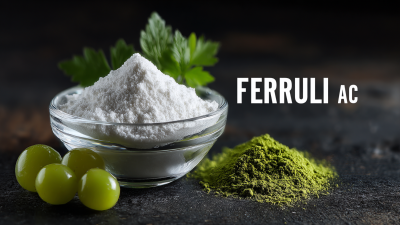
News
Unlocking the Health Benefits of Glutamic Acid in Nutrition and Wellness
In recent years, the interest in glutamic acid, a non-essential amino acid, has surged due to its potential health benefits in nutrition and wellness. According to a report by the International Journal of Clinical Nutrition, glutamic acid plays a crucial role not only in protein synthesis but also in neurotransmission and metabolic processes.

It is considered a key player in promoting brain health, as it serves as a precursor for neurotransmitters such as glutamate, which is essential for cognitive function and learning. Furthermore, current findings indicate that glutamic acid may enhance the absorption of essential nutrients and support gut health, underlying its importance in a balanced diet.
With a growing body of research suggesting its multifaceted roles, unlocking the health benefits of glutamic acid could pave the way for innovative dietary solutions to improve overall wellness.
Understanding Glutamic Acid: A Key Player in Nutrition and Wellness
Understanding Glutamic Acid: A Key Player in Nutrition and Wellness
Glutamic acid, a non-essential amino acid, plays a pivotal role in maintaining overall health and wellness. As a vital component of protein synthesis, it is crucial for muscle growth and repair. Research indicates that glutamic acid contributes to brain health by acting as a neurotransmitter, facilitating communication between nerve cells. According to a study published in the "Journal of Nutrition," glutamic acid supplementation has been shown to enhance cognitive function in both adults and children, thereby highlighting its importance in cognitive nutrition.
Moreover, glutamic acid has been recognized for its role in gut health and digestion. It supports the integrity of the intestinal barrier, helping to prevent conditions like leaky gut syndrome. A report by the World Health Organization notes that sufficient levels of glutamic acid can improve digestive function, leading to better nutrient absorption. This amino acid is also linked to immune function, playing a part in the synthesis of glutathione, a powerful antioxidant that helps combat oxidative stress in the body. With these various benefits, glutamic acid stands out as a vital nutrient that underscores the importance of amino acids in our diet for optimal health and wellness.
The Science Behind Glutamic Acid: Health Benefits Explained
Glutamic acid, a non-essential amino acid, plays a crucial role in nutrition and wellness, particularly as a neurotransmitter in the human brain. Its significance extends beyond mere nutrition, as emerging research reveals a plethora of health benefits. For instance, glutamic acid is essential for cognitive function, supporting learning and memory through its involvement in synaptic plasticity. This amino acid also contributes to metabolic processes, influencing amino acid metabolism and energy production in the body.
Recent studies highlight the relevance of dietary glutamic acid in the context of holistic health. Just as tempeh, a fermented food rich in probiotics, supports digestive health and offers anti-diabetic properties, glutamic acid appears to enhance gut health as well. The connection between gut health and overall wellbeing cannot be overstated; a balanced gut microbiome aids in reducing inflammation and improving nutrient absorption. Furthermore, the excitement around combining glutamic acid with other health-promoting nutrients found in foods like avocado oil and resistant starch showcases the potential for promoting better health outcomes. Understanding the science behind glutamic acid opens new avenues in nutrition, encouraging a more integrated approach to wellness.
Health Benefits of Glutamic Acid
Incorporating Glutamic Acid-Rich Foods into Your Diet
In recent years, the health benefits of glutamic acid have garnered significant attention in nutrition and wellness. This non-essential amino acid plays a crucial role in various bodily functions, including brain health and metabolism. To harness these benefits, incorporating glutamic acid-rich foods into our diet is essential. Some excellent sources include fermented foods such as miso and tempeh, as well as protein-rich options like meat, fish, and dairy products.
In addition to these traditional sources, plant-based foods also offer a wealth of glutamic acid. Vegetables such as spinach, tomatoes, and mushrooms are not only nutritious but can enhance the overall flavor profile of meals. By including these foods in our daily menu, we can enrich our dietary intake of glutamic acid, thus promoting better energy levels and cognitive function. Experimenting with various recipes that highlight these ingredients can make the journey toward improved wellness enjoyable and delicious. Embracing a diverse diet that features glutamic acid-rich options paves the way for a healthier lifestyle.
Unlocking the Health Benefits of Glutamic Acid in Nutrition and Wellness - Incorporating Glutamic Acid-Rich Foods into Your Diet
| Food Item | Glutamic Acid Content (g per 100g) | Health Benefits | Serving Suggestions |
|---|---|---|---|
| Seaweed | 0.5 - 4.0 | Rich in vitamins and minerals, improves digestion | As sushi wrap or salad ingredient |
| Mushrooms | 0.5 - 1.5 | Supports immune function, antioxidant properties | In soups, stir-fries, or grilled |
| Tomatoes | 0.2 - 0.4 | Heart health, skin protection | In salads, sauces, or sandwiches |
| Cheese | 0.5 - 3.0 | Calcium source, supports bone health | As a snack, in sandwiches or melted on dishes |
| Soy Sauce | 1.5 - 4.0 | Enhances flavor, aids digestion | As a condiment for various dishes |
| Spinach | 0.2 - 0.4 | Rich in iron, supports energy levels | In salads, smoothies, or cooked dishes |
Tips for Maximizing the Health Benefits of Glutamic Acid
To maximize the health benefits of glutamic acid in your diet, consider incorporating foods rich in this amino acid, such as fermented products, meats, and dairy. Fermented foods like kimchi, miso, and yogurt not only provide glutamic acid but also contribute probiotics, enhancing gut health and immune function. Opting for lean meats and fish can also boost glutamic acid intake, as these sources support muscle repair and overall body function.

In addition to dietary choices, timing and preparation techniques can enhance glutamic acid's efficacy. Cooking techniques such as slow cooking or fermentation can increase the bioavailability of glutamic acid, making it easier for your body to absorb and utilize. Combining glutamic acid-rich foods with antioxidants, found in colorful fruits and vegetables, can further amplify their health benefits by combating oxidative stress. Incorporating these tips into your nutrition routine may lead to improved wellness, enhanced mood, and better cognitive function.
Potential Side Effects and Considerations of Glutamic Acid Intake
Glutamic acid, an amino acid found naturally in many foods, is often celebrated for its role in promoting brain health and enhancing athletic performance. However, while its benefits are prominent, potential side effects and considerations should not be overlooked. Some individuals may experience sensitivities or adverse reactions, particularly those with certain medical conditions like epilepsy or those prone to migraines. It's essential to monitor your body's response when increasing glutamic acid intake, especially through supplements or high-glutamate foods.
Tips for incorporating glutamic acid into your diet safely include starting with small amounts to assess tolerance. Pay attention to how your body reacts, especially if you experience symptoms such as headaches or digestive discomfort. Additionally, focusing on whole food sources—like tomatoes, mushrooms, and fermented products—rather than processed foods rich in added glutamates can help minimize risks while still reaping the benefits. Lastly, consulting with a healthcare professional before making significant dietary changes can provide personalized guidance, ensuring your nutrition supports your overall wellness without unnecessary side effects.

Related Posts
-

Top Strategies for Leveraging Ethyl Levulinate in Sustainable Chemical Manufacturing
-

Revolutionizing Nutrition Trends in 2025 How Best Vitamin C Coated Products Enhance Global Supply Chain Efficiency
-

China's Leading Production of Tylosin Tartrate Setting Global Standards
-

Unlocking the Health Benefits of Best Soybean Oil: A Global Perspective on Nutritional Value and Quality
-

7 Essential Tips for Sourcing the Best Ferulic Acid in Global Markets
-

Exploring the Future of Best Ethyl Oleate in 2025 Technological Advancements and Market Insights





